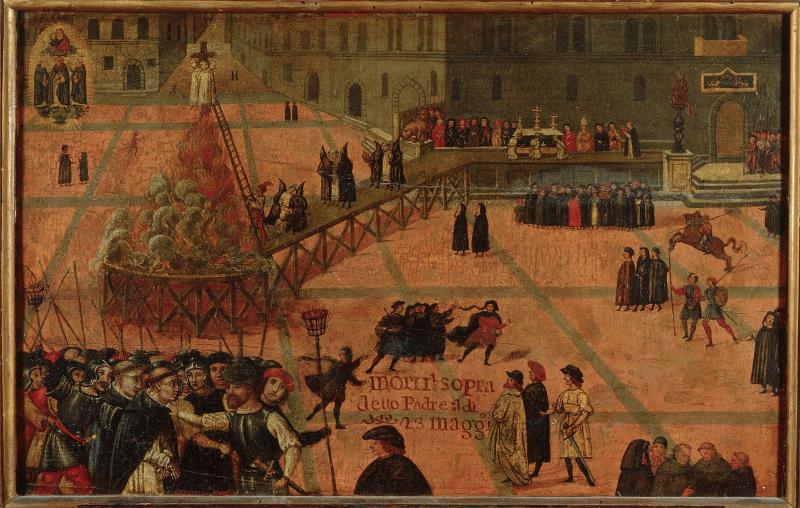Aggeus, Sermon XXIII - 28 December 1494
The Aggeus, Sermon XXIII on 28 December 1494 opens with the image of God’s light upon which the foundation of Florence rests. Citizens must seek this light as a gift worth more than earthly possessions. Comparing Florence to a garden, Savonarola notes that there were many good flowers that tried to grow and bear fruit but were hindered by weeds that tried to spoil them. God, the gardener, wanted to get rid of these weeds and did so via tribulations.[1] Much like the garden, the heavenly city is ruled by God and is “governed with the utmost order and quiet and peace; so would I like your city to be”.[2] In this city, everyone is given their role chosen by God and they do not desire more than what has been granted to them. Therefore, “no citizen should seek to be first or superior to the others but [all] should be content, each within his own degree and limit”.[3] While detailing the hierarchy of Heaven, he notes how this can be paralleled and carried out in Florence. Indeed, Florence would be blessed if they sought to make their city’s government like that in Heaven. Once more, the people are informed that God will provide for them if they reform their religious practices and abandon those which are unholy and focus on merriment. With God’s help, Florence must expel evil and unholy men, both in the secular and religious spheres. Because the city is home to both good and bad, it is imperative that pious and righteous magistrates are elected so that the good may be protected and the bad punished.[4] Savonarola explains how God will punish those who are evil and contradict his will. While he advocates for a civil government created in God’s image, he does propose a ruler and king in Christ. This is the only figure the Florentines should look to as a master. Jesus will be the one to guide them towards their new reform and unite the people of Florence. Savonarola wants to do away with partisanship and factions to unite the city via faith and providence. The sins of the citizenry have endangered the city, but he has been praying for their salvation and will guide them towards it. To cement his role as caretaker and guardian, Savonarola admits: “Everything I have done or am doing, everything is for your well-being.”[5]
Without mentioning their name, the Medici are referenced to throughout this sermon - as weeds that prevent the good plants from growing. This allusion or political allegory criticizes the actions of the Medici, whom Savonarola describes as “those wise of the world, that is, they seem to be wise to the world, and always it is from them that the contradiction against faith arises.”[6] While the Medici were strong proponents of the Greco-Roman revival during the Renaissance, their interest in past knowledge and art could be seen as invading the garden of Florence’s piety. Lorenzo himself was interested in literature and poetry as his court was home to Neoplatonists. The lavish Medici lifestyle, afforded by their success as bankers, supported further patronage of the arts and other lost forms of wealth and acquisition. According to Savonarola, such vanities go against the apostolic teachings of Christ. He also asserts that no one should seek more than his power allows nor should they desire more than what has been given to them by God. The Medici, and other prominent families in Florence, constantly sought to expand their wealth and gain more authority. Therefore, they did not settle for the positions God granted them and actively pursued more. Savonarola spends much of this sermon imploring citizens to pray for the removal of tyrants (although that term is not used as much here as it was in the previous sermon). These “proud, vicious, [and] foolish men”[7] will continue to bring evil into the city and threaten its peace and unity. So long as the people follow Savonarola’s instructions, God will reward them and punish those who contradict Him. The expulsion of the Medici in the previous month was interpreted as a divine favour, for God rid the city of those who put it in danger of sin. Interestingly, Savonarola discloses that his own designs for the religiopolitical reform of Florence mirrors those of the Lord’s. After explaining the hierarchies of Heaven, he states: “Now, does this not seem to you a most beautiful order? This is the way I would like, if I could, to make the government of your city be like God’s.”[8] Disguised as a sermon, he provides Florence with his vision for its government.
